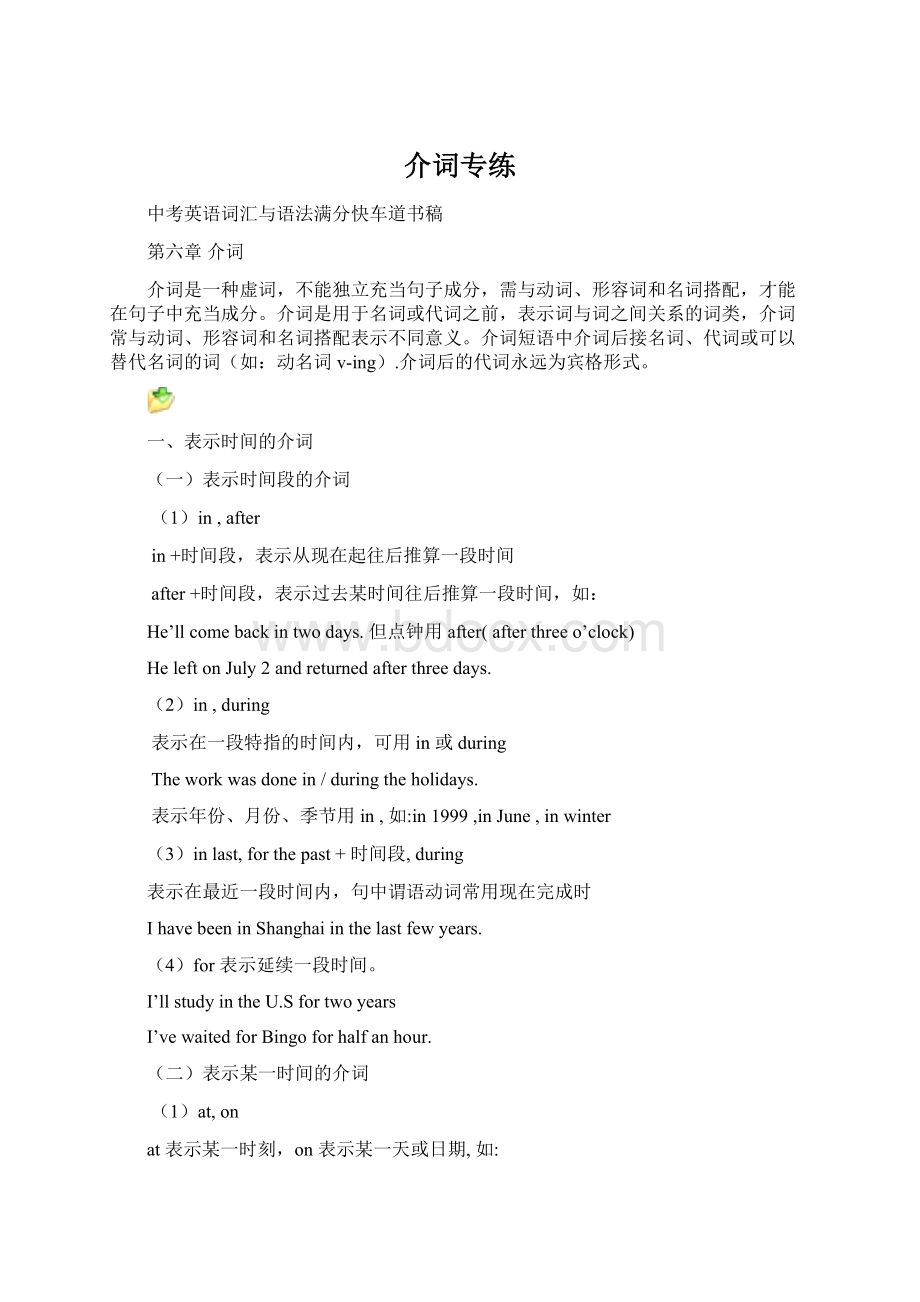介词专练.docx
《介词专练.docx》由会员分享,可在线阅读,更多相关《介词专练.docx(14页珍藏版)》请在冰豆网上搜索。

介词专练
中考英语词汇与语法满分快车道书稿
第六章介词
介词是一种虚词,不能独立充当句子成分,需与动词、形容词和名词搭配,才能在句子中充当成分。
介词是用于名词或代词之前,表示词与词之间关系的词类,介词常与动词、形容词和名词搭配表示不同意义。
介词短语中介词后接名词、代词或可以替代名词的词(如:
动名词v-ing).介词后的代词永远为宾格形式。
一、表示时间的介词
(一)表示时间段的介词
(1)in,after
in+时间段,表示从现在起往后推算一段时间
after+时间段,表示过去某时间往后推算一段时间,如:
He’llcomebackintwodays.但点钟用after(afterthreeo’clock)
HeleftonJuly2andreturnedafterthreedays.
(2)in,during
表示在一段特指的时间内,可用in或during
Theworkwasdonein/duringtheholidays.
表示年份、月份、季节用in,如:
in1999,inJune,inwinter
(3)inlast,forthepast+时间段,during
表示在最近一段时间内,句中谓语动词常用现在完成时
IhavebeeninShanghaiinthelastfewyears.
(4)for表示延续一段时间。
I’llstudyintheU.Sfortwoyears
I’vewaitedforBingoforhalfanhour.
(二)表示某一时间的介词
(1)at,on
at表示某一时刻,on表示某一天或日期,如:
at7:
14,onSaturdaymorningonthenightofMay2
一天内各段时间表达,选用正确的介词,请比较:
inthemorning
onawinter/snow/cold/morning
atnight
onthenightofMarch7th
intheevening
onFridayevening
(2)before,by
before表示某一时间之前,而by表示到某一时间止,句中谓语动词多用完成时态。
如:
:
Youmustgetupbeforesix.你必须六点之前起床。
Bytheendoflastmonththeboyhadgot4“As”.
到上月底这个男孩已得了4个A.
(3)after,since
after可以表示过去某一点时间之后,并不延续说话时间,和一般过去连用,而since表示从过去某时间开始的一段时间延续到说话时间,与现在完时连用如;
MyfatherlivedinShanghaiafterliberation.
解放后我父亲住在上海.
Sincetheendoflastyeartheladyhasgivenfiveconcerts.
自去年年底以来,这位女士开了五十场音乐会
(4)from…to,until/till
from----to表示从某一点时间到另一点时间的一段时间,而untiltill表示某动作或状态延续到某点时间如:
MymotherstudiedinBeijingUniversityfrom1960to1964.
从1960年到1964年我妈妈在北京大学学习。
MymotherenteredBeijingUniversityin1960,andstudiedthereuntil1964.
我妈妈1960年进入北京大学,一直学习到1964年。
(但“从早到晚”常表达为frommorningtillnight)
(三)不用介词表示时间的词或词组
含this,that,last,next的表示时间的名词词组,以及某些时间的副词或名词词组前不用介词,如:
thisyearlastsummer,yesterday,thedayaftertomorrow等。
二、表示事物之间位置的介词
(1)at,in
当事物被视作一点,不强调其空间常用介词at,而表示空间内部用介词in,如:
We’llmeetatthesupermarket我们在超市见面
Ihadtostayinthesupermarketasitwasraininghard
因为下大雨,我只好呆在超市里
*动词arrive后接at,表示较小的地方,如:
车站、村庄等.后接in表示较大地方,如:
城市,地区等
(2)in,to
in表示事物在区域范围内的位置,to表示事物对区域范围之外另一事物的位置,如:
ShanghaiisintheeastofChina.上海在中国东部
JapanliestotheeastofChina.日本位于中国东面。
infrontof表示在前面,一般不在范围内,inthefrontof表示在前面.在同一范围内。
(3)after,behind
after指顺序先后,behind指位置在某事物之后,相对于infrontof而言,如:
Heenteredtheclassroomaftertheteacher
Hehidhimselfbehindthedoor他在门后。
(4)on,in
on表示“在某事物表面上”。
如将事物看作空间,表示在其内部,用介词in。
Thereisamodernpaintingonthewall.
Thereisamodernpaintingonthewall.
(5)from,off都表示“离开”
(6)above,over,below,under
over,under表示垂直的上下关系,而above,below仅表示位置上“高于”或“低于”,不表示垂直关系。
(7)between,among
between表示“两个事物之间”,among表示“三者以上的事物之间”。
三、表示运动方向的介词
(1)into,inside,in从外到内如:
Hewentquicklyinto/insidetheroom.
Hewentquicklyinto/insidetheroom.
(2)outof从里到外,相当于outside,或从里向外,相当于from
Shewentoutoffromtheofficeinahurry她匆匆走出办公室.
Theboywatchedthebuses,carsandbikesoutfromthewindow.
这男孩透过窗观看外面的公交车、小汽车和自行车。
(3)on在……表面,onto到……上
Aboatisontheriver.一条小船在河上。
Hejumpedontoatree.他跳上一棵树
(4)across穿过一平面、through穿过一空间
Theboykickedtheballhardanditmovedacrossthegrass.
这男孩用力踢球,球飞过草地。
Thetrainmovedfastthroughthetunnel.火车飞驶隧道。
(5)Thetrainmovedfastthroughthetunnel.火车飞驶隧道。
Shewalkedtothebank她步行到银行去
Sheswamtowardstheshore她朝岸边游去。
四、常用介词用法比较
(1)as,like
as表示“作为”强调身份,like(介词)表示“像”
Asateacher,hecaresforthesechildren.
Likeateacher,hecaresforthesechildren.
(2)with,in
with表示“外貌特征或附带的东西”,“用……作工具”
in表示”衣着””用某语言”,在固定搭配中也可用in
Amanwithdarkglasseswantedtobuydrinks.
Amaninblackwantedtobuydrinks.
Theboyislearningtowriteinpencil/withapencil.
HeretoldthetextinEnglish.
(3)for,to
for表示“为了.”
To表示动作对象,“对,向.”如:
Hewoulddoanythingforhismotherland.
Didyoumentionthistomyfather?
你对我父亲提起过这件事吗?
for表示“就某情况而说”,to表示一“对某对象而言”如:
It’squitewarmtodayforFebruary.就二月的天气,今天够暖和的。
Whathetoldyoujustnowwasnotnewtome
他刚才对你所说的话对我并不新鲜
for表示“目的,用途”。
与go,come动词连用,
(4)except,besides
except表示“从总体中排除一部分”,与bat同义,besides表示“除了一部分还有另一部分”
Weallfailedexcepthim.我们都失败了,但他没有。
HespeaksGermanbesidesFrench.他懂法外还会讲英语。
(5)注意成对介词的用法:
getinto(outof)thecar,geton(off)thebus,jumponto(off)theplatform,outof
(6)介词和名词动词等有不少固定搭配和习惯用法:
toone’ssurprise/joy,inchargeof,insteadof,inbed(hospital),introuble,inahurry,insurprise,withasmile,withonevoice,accordingto,atonce,ontime,intime,inall,athome,(school,work),atlast,atleast,intheend,bytheway,forexample,atthesametime,atthesamespeed,onone’sway(to),inthesun,onthefootballteam,inline,withthehelpof,inred/green…puton,lookfor,lookafter,runafter,sendfor,enterfor,payfor,show…around,listento,arrivein/at,getto,agreewith,succeedin,thinkof(about),waitfor,….
(7)表示加减乘除,分别用介词plus,minus,times和动词过去分词divided+by
第二节实战演练
一、例题选讲
例1
Wewillplayfootballthreeo’clock.
A.
In
B.
After
C.
To
D.
since
答案:
B
提示:
这四个选项的介词都可以表示时间,但含义和用法不同。
in常用来表示以现在为起点的将来一段时间之后,after·可表示从过去为起点的一段时间之后,通常与过去时连用。
但要注意after·也可以表示将来某一特定时刻之后。
本题里after表示将来某一特定时刻。
例2
Thestorytookplaceacoldnight.
A.
in
B.
after
C.
to
D.
since
答案:
B
提示:
on通常指特定时期:
或表示某一天的上午,下午,晚上等。
句中的时间状语acoldnight已表明在某个寒冷的夜晚,其前面应使用介词on。
例3
Wewillplayfootballthreeo’clock.
A.
In
B.
After
C.
To
D.
since
答案:
B
提示:
这四个选项的介词都可以表示时间,但含义和用法不同。
in常用来表示以现在为起点的将来一段时间之后,after·可表示从过去为起点的一段时间之后,通常与过去时连用。
但要注意after·也可以表示将来某一特定时刻之后。
本题里after表示将来某一特定时刻。
例4
Thestorytookplaceacoldnight.
A.
in
B.
after
C.
to
D.
since
答案:
B
提示:
on通常指特定时期:
或表示某一天的上午,下午,晚上等。
句中的时间状语acoldnight已表明在某个寒冷的夜晚,其前面应使用介词on。
例5
ThisisthebusthePeople’sPark.
A.
at
B.
for
C.
to
D.
towards
答案:
B
提示:
四个选项的介词表达的意义不同。
at表示“在某处,在……旁边”,for表示“(动身)去……处”,to表示“到……某处”,towards表示“向……某处”。
例6
—Areyourparentsworkers?
—No,isaworker.
A.
neither
B.
none
C.
either
D.
both
答案:
A
提示:
neither是对两个人或事物的否定,谓语用单数形式;而both则是对两个人或事物的肯定,谓语用复数形式。
例7
Theworkcostusmorethanfiveweeks.(保持原意)
morethanfiveweeksthework.
答案:
Wespent,on
提示:
cost表示花费时间,只能用表示事物的词作主语,而spend也表示花费时句子主语必须是人。
注意spend…on,表示在某事上花费。
例8
Beijinghasalotofoldbuildings.Italsohasalotofnewones.(合并一句)
答案:
Beijinghasnotonlyalotofoldbuildingsbutalsoalotofnewones
提示:
这道题主要掌握表示递进关系的连词词组。
例9
Mybrotherlikesskating.Ilikeswimming.(合并一句)
答案:
MybrotherlikesskatingbutIlikeswimming.
提示:
这道题的两个句子主语不是同一个人,谓语动词之后的部分也不同,实际上是把喜欢的内容由一个方面转到另一个方面,所以用but把两个句子连接起来。
例10
Heistooyoungtojointhearmy.(改复合句)
答案:
Heissoyoungthathecan’tjointhearmy.
提示:
so...that表示否定时可与too…to转换。
例11
Thereisaholethewall.
A.
in
B.
on
C.
of
D.
with
答案:
A
提示:
在墙的里面,用inthewall,而onthewall指在墙的表面上。
例12
EnglishnamesaredifferentChinesenames.
A.
between
B.
of
C.
from
D.
about
答案:
C
提示:
bedifferentfrom表示“与……不同”,是一个固定词组。
例13
WealwayshaveaclassmeetingMondayafternoon.
A.
at
B.
on
C.
in
D.
of
答案:
B
提示:
在某天的上午下午或晚上,介词应使用0n。
例14
Pleasewriteitink
A.
with
B.
in
C.
by
D.
of
答案:
B
提示:
如果表示用墨水写该用in,不能用with。
例15
I’llreturnthebooktothelibraryIfinishreadingit
A.
when
B.
if
C.
assoonas
D.
as
答案:
C
提示:
此句意思为我一看完这本书就还给图书馆,assoonas是“一……就……”的意思。
二、复习时需要注意的要点
(1)介词一般放在名词之前,但它后面的介词宾语是疑问代词、疑问副词或者关系代词时,这些词提到了前面而只剩下介词在后了。
(2)介词和动词、形容词、名词等常常构成固定搭配,也就是说,在这些词的后面常常要求用一定的介词。
这一点在学习时要特别注意。
如:
a.动词+介词:
laughat,waitfor
b.形容词、过去分词+介词:
begoodat,beprondof
c.名词+介词:
payavisitto,thekeyto
第三节巩固练习
I选择填空
1.I’llgetoff_____NanjingRoad.Ilive_____200NanjingRoad.
Aat,atBon,onCat,inDon,at
2.Heisgood_____volleyball,.Hewas_____theschoolvolleyballteam.
Ain,inBat,atCon,onDat,on
3Childrenalwaysgetpresents_____ChristmasDayinthewest.
AonBatConDin
4._____thehelpoftheteachers,hehasmadegreatprogress_____threemonthsago.
AIn…forBIn…since
CWith…sineDWith…for
5Whenclassisover,thestudentsgo_____theclassroom.
AintoBinConDoutof
6.There’snosmoke______fire.
A.withBwithoutCifDin
7.Whatdoesyourfatherlook_____?
-Tallandthin.
AlikeBasCforDin
8.Theteachersareoftengiven_______someflowers_______thestudents______Teachers’Day.
AX,by,inBto,by,on
CX,by,onDto,by,in
9.Heisreadingmagazines____thereading-room______.
Hewillcomeback______halfanhour.
Ain,atthattime,inBon,atthatmoment,after
Cby,atsometime,onDin,atthemoment,in
10.Haveyougoteverythingready_______apicnic?
AonBforCinDduring
II在每格中填入适当的介词:
1.Hejumped________joy.
2.Whenstillachild________four,hecouldalreadywrite.
3.You’dbetterspeak_________themanageraboutit.
4.Hespendtoomuchtime______playingvideogames.Itisbad______him.
5.Wemustbestrict_________thestudentsand_______ourwork.
6.Pleasegivethebooktotheboy______thecorner.
7.IboughtacopyofShanghaiStudents’Post_______myway_____
home.Ireadit_____theunderground.BythetimeIarrived______
myneighbourhood,I’dreadhalf_______it.
8.Iwasborn______themorning_____December3,1985.Wewereborn______thesameyear.
9.Mymotheropenedmyletterinstead________hers.Iwasangry______
her.
10.Howmuchdidyoupay_______thenewbike?
III.用方框内的介词填空
on,by,from,in,without,behind,of,across,along,before,until,to,beside,between
1.Hefoundhimselffall________theothersafterhecamebackfromtheU.S.A..
2._____allthestreets,NanjingRoadisthebusiest,